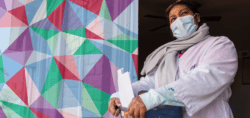2021 Annual Report
A More Equitable World, Together
Increasing Our Commitment to Health Equity
In many ways, 2021 was another difficult year for the world’s health. It was a year of deadly COVID-19 variants, devastating hurricanes, catastrophic disasters, and tragic losses in maternal and child health that will take years to undo.
But even more alarming, it was a year in which health inequities increased, especially among vulnerable populations, communities of color, and those disproportionately affected by COVID-19.
Health inequities are often visible, especially during humanitarian crises such as those in Venezuela, Syria, Yemen, or Ethiopia. But they can also be harder to see—like a rural community in Haiti that loses its clinic after a powerful earthquake. Or a neighborhood in Nepal whose hospital runs out of oxygen. Or even an immigrant community in Texas without the access to vaccines that many of us take for granted.
At Project HOPE, we refuse to accept these things as normal. Our teams around the world worked tirelessly in 2021 to improve access to health care, especially on the front lines of health systems hit hard by the pandemic. With your support, we were able to deliver lifesaving vaccines, PPE, medical equipment, and training to help health workers facing deadly COVID-19 waves, all while ensuring that our essential global health work continues to improve health equity among those who need it most, including mothers, children, people living with disease, and those facing the aftermath of disaster.
Access to health care should be a fundamental right for all people everywhere, regardless of gender, age, race, resident status, religion, or income. Because of your support, we were able to live up to this principle in 2021. Thank you for supporting Project HOPE and improving access to health care around the world.


Rabih Torbay
President and CEO
The World Needs HOPE More Than Ever
When I stepped into my role in 2018, I knew I would be chairing the board of a highly capable, mission-driven organization. I never could have imagined the challenges we would face in 2021: a pandemic, multiple humanitarian crises, and an increasing number of devastating natural disasters around the world. I have watched with a great deal of pride as our team has risen to every challenge, while responding to each of these crises.
As we look back on our work from 2021, we are mindful that our programs in other regions of great need cannot be interrupted. Project HOPE continues to deliver maternal health services near the Colombia/Venezuela border, train health care workers in Sierra Leone, establish new Neonatal Intensive Care units in the Dominican Republic, to provide mobile health clinics after the devastating earthquake in Haiti, and more. Even in the U.S., the pandemic exposed many communities with limited health care access, and we responded to support them and ensure health equity for all. It has given us a perspective that we need to do more domestically in the future.
As you read this report, please know how important you are to our mission. We are incredibly grateful for your support — whether as a volunteer, donor, corporation or foundation partner, general supporter, or an advocate. Many of you have been on this journey with us for years. Your involvement is critical, and we could not do what we do without you.
I hope you will be gratified to see the progress and impact that Project HOPE has made. Thank you for your support.


Reynold W. Mooney
Chair, Project HOPE Board of Directors
Download the full report >>


Responding to Deadly COVID-19 Waves in India and Nepal
In a year of COVID-19 variants, none was more devastating than the Delta variant, especially in India, Nepal, and Brazil. In April 2021, India became the first country to experience 400,000 new cases of COVID-19 in a single day, with daily death rates soaring into the thousands. Communities were decimated, hospitals were overwhelmed, and health care workers faced critical shortages of medicines, beds, ventilators, oxygen, and PPE.
India’s outbreak had a tragic impact on Nepal, which experienced a 4,000% increase in COVID-19 cases in a matter of weeks. Nepal faced critical shortages of medicines, beds, ventilators, oxygen, and PPE at the peak of the wave, with the border province of Lumbini especially hard hit.
Thanks to support from partners including AbbVie, AT&T, John Hancock, Latter-day Saint Charities, New York Life, and S&P Global, Project HOPE rapidly procured PPE, oxygen, and critically needed medical equipment to help India’s health care workers respond to the dramatic spread of the disease. And with support from Amgen, we were also able to provide critical medical equipment, oxygen, and support for neighboring Nepal. Even amid heartbreaking loss, Project HOPE was there to support frontline health care workers, patients, and families in the moments that mattered most.


Brazil also experienced a devastating COVID-19 outbreak in 2021 that overwhelmed the health care system and caused critical supply shortages. With support from AbbVie, Project HOPE provided extensive training for frontline health workers, focusing on COVID-19 fundamentals, COVID-19 vaccines, and tools to safeguard their mental health. We also procured lifesaving ventilators, intubation kits, and medications to help meet the needs of the overburdened health system. “The donated medicines and ventilators were of great value for the health care of the population of Sergipe, especially for patients with COVID-19 in critical condition,” said Adriana Menezes de Souza, Superintendent of the Department of Health of the State of Sergipe.


Expanding Vaccine Equity in Texas
In Houston and McAllen, Texas, critical gaps in vaccine access affect families in underserved, uninsured, and marginalized communities. Project HOPE worked with free and charitable clinics in Harris and Hidalgo counties to improve access to COVID-19 vaccines, combat misinformation, and vaccinate thousands of people.
“We are really happy here,” says Kalil, a refugee from Afghanistan whose family was vaccinated by San Jose Clinic in Houston. “The kids are in school, so when we heard the vaccine was available for kids and it was safe for them to have it, we wanted them to be safe. Since we were able to get it here in our home, it was very convenient.”
“I’m here to help the public understand the importance of science and give them education. I’ve seen how hard scientists work. I’ve seen how hard doctors work, and we’re not in it for the money, because there’s no money for us. We’re here because we want to help.”
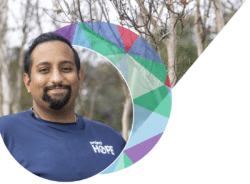

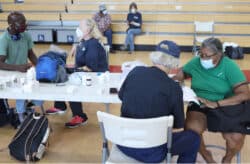

 Through the United Airlines Miles on a Mission campaign, United MileagePlus members were able to donate unused airline miles for Project HOPE to deploy volunteers across the country. At the height of the pandemic, that support allowed us to send medical volunteers to hard-hit areas as soon as the need was apparent. “Partners like United are an essential part of our mission. We couldn’t support the health care needs and capacity of vulnerable populations without their support,” said Harley Jones, Project HOPE’s Senior Manager of Domestic Emergency Response.
Through the United Airlines Miles on a Mission campaign, United MileagePlus members were able to donate unused airline miles for Project HOPE to deploy volunteers across the country. At the height of the pandemic, that support allowed us to send medical volunteers to hard-hit areas as soon as the need was apparent. “Partners like United are an essential part of our mission. We couldn’t support the health care needs and capacity of vulnerable populations without their support,” said Harley Jones, Project HOPE’s Senior Manager of Domestic Emergency Response.


Delivering Hope to Haiti’s Survivors
The 7.2-magnitude earthquake that struck southern Haiti in August 2021 brought an immense amount of devastation and need. More than 2,000 people were killed and 12,000 injured, many of whom lived in communities still struggling to recover from the 2010 earthquake and Hurricane Matthew.
Thanks to support from Latter-day Saint Charities and The Stabler Foundation, Project HOPE’s emergency response team was able to deploy immediately and was soon on the ground in the most affected areas, delivering critical medicines and medical supplies such as bandages, sutures, and antibiotics to health facilities in Les Cayes and the surrounding areas.

“My house is completely destroyed and I feel overwhelmed by the situation. Getting these free medicines is a great relief because my son is sick.”

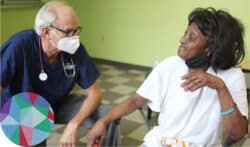
Deploying Hurricane Relief to Louisiana
Hurricane Ida was a devastating blow to southern Louisiana, making landfall as a powerful Category 4 hurricane with maximum sustained winds of 150 miles per hour and leaving more than 1 million residents without power. Multiple hospitals and medical facilities were damaged, and thousands of evacuees were forced to flee to shelters.
Project HOPE immediately deployed an emergency response team to deliver medical care in Louisiana, working side by side with local authorities to triage evacuees, provide medical care in shelters, conduct mobile health assessments, and visit a 200-unit apartment complex to provide health and wellness checks. Project HOPE also provided medical services to the United Houma Nation tribal community members at the Houma Nation Community Center in Houma, Louisiana, as well as recovery support for at-risk youth at Covenant House New Orleans.

Support from Medtronic Foundation has helped Project HOPE respond to multiple disasters in recent years, including Hurricane Ida in 2021. Medtronic Foundation was the first corporate partner to support Project HOPE’s Emergency Response and Preparedness Fund, which allows our emergency response team to deploy immediately when disaster strikes.

Supporting Health Workers’ Mental Health

Health care workers are among the people most vulnerable to the mental health effects of the pandemic. More than half of those responding to COVID-19 have experienced mental health issues, with nurses and doctors reporting high rates of anxiety, depression, suicide, insomnia, and distress. This crisis is made more difficult because of the stigma that surrounds mental health care, especially among health workers.
To address this growing crisis, Project HOPE continued to implement mental health and resilience trainings for health care workers across the globe. The trainings were based on NYC Health + Hospitals’ HERO-NY series and included sessions on stress, trauma, resiliency, personal wellness, and how to seek help. Thanks to support from the Center for Disaster Philanthropy, this work has now expanded to reach 50,000 health care workers across five continents.
“COVID-19 has put the mental well-being of the entire world at risk. Health care workers have been experiencing extended high levels of stress like never before,” said Rawan Hamadeh, Project HOPE’s program officer overseeing mental health programming. “It’s important that we acknowledge the exponential need for mental health support for health care workers — and particularly health care mothers — who are juggling both their professional duties and their parenting responsibilities. The mental health and resilience training provides a safe space for doctors, nurses, and other frontline workers to share their struggles and to feel that they are not alone in this, free from any stigmatization or judgment.”
“Health care workers responding to COVID-19 have been experiencing extended high levels of stress like never before.”


Equipping a Global Health Workforce
Training health care workers remains a core part of Project HOPE’s work around the world. Thanks to our work, more than 150,000 health workers and frontline personnel received critical trainings on topics ranging from COVID-19 vaccines to maternal health to treating noncommunicable diseases.
With support from Johnson & Johnson and Give2Asia, Project HOPE’s Saving Lives at Birth program trained doctors, nurses, midwives, nutritionists, and community health workers in Indonesia to improve maternal care, including during maternal and neonatal emergencies. Thanks to Project HOPE, more than 19,000 mothers were assisted by a skilled birth attendee in 2021, including more than 3,000 high-risk pregnant women who were able to receive care.
In Colombia, Project HOPE and its university partners, Fundación Universitaria de Ciencias de la Salud and Universidad Autónoma de Bucaramanga, designed and launched new diploma courses in maternal health care and noncommunicable diseases. The diploma courses are particularly critical for doctors and nurses providing care to Venezuelan migrants in the departments of Norte de Santander, Santander, Arauca, and La Guajira. The program also included one-on-one mentorships for faculty members to discuss curriculum, course development, goals, and challenges.
And in Sierra Leone, Project HOPE helped strengthen the neonatal and maternal health workforce through faculty clinical mentorships with neonatal physicians and nurse practitioners who have experience in special care of premature, small, and sick neonates. Faculty members met with their mentors each week in clinical settings such as maternity wards and kangaroo mother care units and made home visits to families with small and sick newborns.

Closing the Gaps to Care
Project HOPE reached millions of people around the world in 2021. But health equity is more than numbers—it means bridging the gaps that prevent people from accessing care.
Health equity has many faces: it can look like a clean water well in the Dominican Republic or a box of medicine in Kosovo. It can be as small as an N95 mask or as large as a mobile health and nutrition team. But in 2021, it was more important than ever.
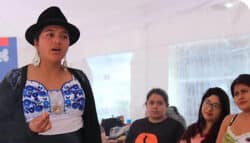
Ecuador
In Ecuador, Project HOPE and the Universidad Católica de Cuenca trained hundreds of health workers to deliver accurate COVID-19 information in the native languages of Kichwa and Shuar, the indigenous languages most widely spoken in rural areas. Training materials were specifically produced for easy use in areas with low internet bandwidth and featured simultaneous audio translations so that participants from indigenous communities could immediately receive the training in Kichwa or Shuar, in addition to Spanish.
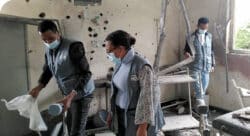
Ethiopia
In Ethiopia, Project HOPE deployed mobile health and nutrition teams to areas affected by conflict in the Amhara region and distributed thousands of emergency health kits to people affected by the emergency. Our teams also helped provide multiple polio immunization sessions, distributed thousands of HIV test kits, conducted malnutrition screenings, and linked people with severe and moderate acute malnutrition to nutritional support services. We also developed radio spots to provide COVID-19 and maternal health information in the Amharic, Somali, and Afar languages.

Mexico
Through the AstraZeneca Young Health Programme, Project HOPE launched a National Committee of Youth for the Prevention of COVID-19 in Mexico. Dozens of youth leaders gained expertise in the prevention of COVID-19 and went on to reach thousands of community members with public health and personal safety information. The result is a nationwide, youth-led pandemic response focused on combating misinformation, preventing the spread of COVID-19, and fostering physical and mental resilience among young people. The leadership opportunity is especially powerful for young women, who have been able to use it as a platform to raise their voices for change in their communities.
In Kosovo and North Macedonia, the cost of some of the most basic and essential medicines required by hospitals can be too expensive, resulting in medicine shortages and stress on an already overburdened health system. Through the Strategic Medical Resupply Program, Project HOPE and Merck & Co. have partnered to ship essential donated medicines, medical equipment, and supplies to hospitals in Kosovo and North Macedonia, allowing medical institutions to apply limited financial resources to improve patient care.
Women and children in the Dominican Republic face some of the highest mortality rates in the region, especially in rural communities. Thanks to the support from The Elsa and Peter Soderberg Charitable Foundation, Project HOPE is working to improve access to primary health care services for vulnerable women and children in Los Rieles and surrounding communities in La Vega. As part of this work, Project HOPE converted the La Sabaneta Primary Healthcare Unit to a Specialized Primary Health Level Center focused on reproductive, maternal, neonatal, and child health so that families in La Vega won’t have to travel outside of town to seek health care.

Hope Can Come From Anywhere
 TJ Kim, 18, was on his way to earning his private pilot’s license when
TJ Kim, 18, was on his way to earning his private pilot’s license when
COVID-19 threatened to keep him grounded. In response, Kim
launched Operation SOS: a plan to stay in the air by flying PPE to
rural hospitals across the United States. In total, Kim
delivered more than 100,000 pieces of PPE to health care workers
in need. For his efforts, he won the Prudential Spirit of Community
Award as one of the top youth volunteers in America and chose to
donate the money to Project HOPE.
“I never would have thought it would have been possible to
participate in something like this, but with all the support I’ve been
receiving from the community around me, it’s made it really easy,”
he said. “You’re never too young to make a difference.”
When COVID-19 began overwhelming health systems across America, 
Julia Maddalina, 26, decided to use her paint brush to bring health
workers’ sacrifices to life. Maddalina’s series, “Portraits of the Front line,”
features more than 100 portraits of health workers who have endured
the challenge of COVID-19 around the world. A print featuring the
portraits went on sale last year, with proceeds going to Project HOPE.
“I learned what Project HOPE had been able to do to help health
workers on the front lines. It inspired me and assured me that more
good could come from the paintings I had created,” she said. “These
paintings have brought joy to these 100 individuals, but now they can
also support more health workers through Project HOPE’s work.”
 Online streamers were a powerful force for hope in 2021, using their
Online streamers were a powerful force for hope in 2021, using their
platforms to raise support for Project HOPE’s mission throughout
the year. Using the interactive livestreaming platform Twitch,
hundreds of streamers went live to raise money for our COVID-19
response, mental health work, and emergency responses such as
Hurricane Ida.
“Project HOPE makes you feel like you’re a part of something
bigger,” said Nick, who streams as itsnippy on Twitch and raised
thousands of dollars of support for Project HOPE throughout
the year. “Using my platform, doing what I love to help people all
around the world was really a no-brainer. The transparency and
communication with the Project HOPE team is amazing. They save
lives and provide hope around the world, no matter what the issue is
and that has solidified my support and belief in them.”

Health Affairs
Health Affairs focused on timely topics in health policy and built on its strategic plan goals throughout 2021. The peer-reviewed journal, published monthly by Project HOPE, published on such topics as COVID-19, health equity, and perinatal mental health. To increase audience engagement and knowledge, Health Affairs built on its strategic plan goals, including with a major expansion of its events and podcast program, as well as a rebranding of its blog to Health Affairs Forefront, reflecting its role at the leading edge of health policy.
Health Affairs also published two theme issues: one with a focus on the health of border communities and immigrants in July and one with a cluster of articles on perinatal mental health in October, which explored health conditions affecting the well-being of birthing people, families, and communities.
Vital Directions for the New Biden-Harris Administration
The day after Inauguration Day, Health Affairs partnered with the National Academy of Medicine to publish Vital Directions for Health and Health Care — six commentaries setting priorities for the new Biden-Harris administration. A few weeks later, a virtual event followed that drew nearly 700 attendees. Speakers included Rep. Lauren Underwood (D-IL), co-chair of the Black Maternal Health Caucus and a former official at the Department of Health and Human Services.
Health Affairs Equity Program
Also in 2021 Health Affairs publicly announced its Health Equity Program. Some of the year’s accomplishments included naming and convening an advisory committee, launching a Health Equity Fellowship for Trainees program, analyzing health equity content, and beginning routine collection of author and reviewer demographic education. During the year, the journal celebrated and elevated voices published in Health Affairs from several historically marginalized communities.
Other 2021 Health Affairs Accomplishments
As the COVID-19 pandemic continued, Health Affairs provided critically important and time-sensitive evidence for policy makers as well as the public. As a result, the journal achieved its highest impact factor ever in 2021, at 6.301, which was a full point jump from 2020.
As a well-recognized nonpartisan convener, Health Affairs introduced four new series of virtual events designed to showcase leading policy makers, drill deeper into journal content, and hone the skills of a new generation of researchers.
Health Affairs podcasts nearly doubled their output in 2021. The two main podcasts, “A Health Podyssey” and “Health Affairs This Week,” achieved 51,433 and 28,724 episode downloads, respectively, joining the must-listen list for a growing number of health policy followers, including C-SPAN program producers, who invited Health Affairs senior editor Leslie Erdelack and senior content marketing manager Jeff Byers to appear on its “Washington Journal” program after listening to one of her discussions on “Health Affairs This Week.”
Health Affairs generated 2,171 media citations in 2021. A study finding that women physicians earn an estimated $2 million less than their male counterparts during their careers was covered by media across the country, including The New York Times and, in a Health Affairs first, Saturday Night Live’s Weekend Update.

Financial Summary
Project HOPE’s low overhead means more of your support goes to funding health projects around the world. Project HOPE has earned a reputation for financial integrity and efficiency. We take stewardship seriously, and we work to maximize the value of every contribution we receive.


